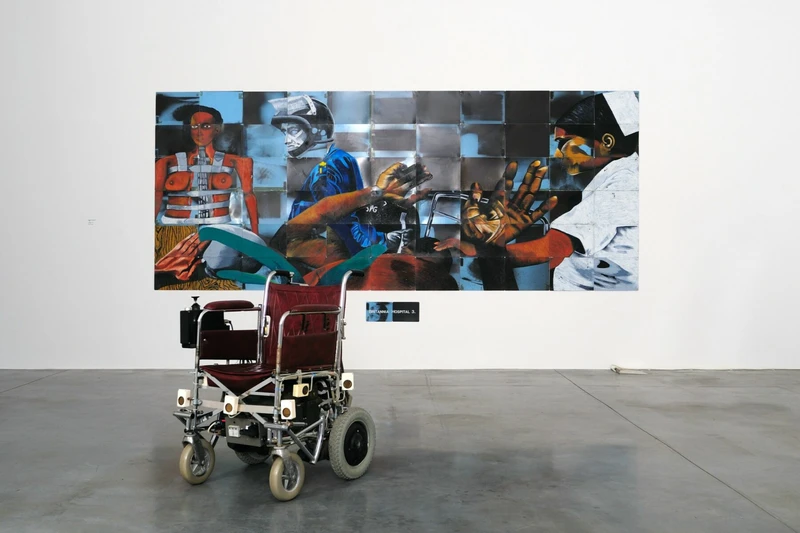Donald Rodney: Visceral Canker
25 May-8 Sep 2024


Spike Island presents a major survey exhibition of late British artist Donald Rodney (b. 1961, West Bromwich; d. 1998, London).
Rodney worked across sculpture, installation, drawing, painting, and digital media, experimenting with new materials and technologies throughout his life. His work is known for being incisive, acerbic, and evocative in its analysis of the prejudices and injustices surrounding racial identity, Black masculinity, chronic illness, and Britain’s colonial past. Rodney was also co-founding member of the BLK Art Group: an association of young Black artists formed in Wolverhampton in 1982.
The exhibition at Spike Island brings together all of Rodney’s surviving works. This includes large-scale oil pastels on X-rays, kinetic and animatronic sculptures, and restaged installations, as well as sketchbooks and rare archive materials, spanning 1982 to 1997. Also on display is Autoicon (1997–2000), an interactive digital artwork initiated by Rodney and finalised by a group of his close friends after he died from sickle cell anaemia in 1998.
Rodney suffered from sickle cell throughout his life. This meant persistent pain, regular invasive treatments and increasing immobility. Though these were extremely challenging experiences, Rodney often incorporated them directly into his work as metaphors for the illnesses and injustices of society at large. This is evident in works such as Flesh of My Flesh (1996), a photographic triptych that includes a close-up of a raised scar on Rodney’s thigh; and My Mother, My Father, My Sister, My Brother (1997), a tiny maquette of a house made from pins and his own skin.
Visceral Canker aims to introduce a new generation of audiences to Rodney’s life and work, cementing his place as a vital figure in British art. The title comes from a 1990 work by the artist, which comprises two wooden plaques displaying heraldic images, linked together by a system of medical tubes that pump theatrical blood. It exemplifies both the viscerality of Rodney’s work and politics, and his persistent scrutiny of the canker, or disease, at the heart of society: in this case specifically, how the inhumanity of Britain’s colonial history continues to structure life today.
The exhibition is curated by former Spike Island Director Robert Leckie and Nicole Yip, Chief Curator at Nottingham Contemporary. It is presented in partnership with Nottingham Contemporary and Whitechapel Gallery, where it will tour on Spike Island.
Donald Rodney
Donald Rodney (b. West Bromwich, 1961–1998) was a British artist. He was born in West Bromwich, to Jamaican parents, and grew up in Smethwick, on the outskirts of Birmingham. He studied Art Foundation at Bournville School of Art, Birmingham (1980-81); BA Fine Art at Trent Polytechnic in Nottingham (1981–1985); and completed a Postgraduate Diploma in Multi-Media Fine Art at Slade School of Fine Art in London (1987). Rodney first gained visibility as a member of the BLK Art Group in the early 1980s, through a series of exhibitions titled The Pan-Afrikan Connection (1981–84).
Rodney’s solo exhibitions include Reimagining Donald Rodney, Vivid Projects, Birmingham (2016); Donald Rodney – In Retrospect, iniva, London (2008); 9 Night in Eldorado, South London Gallery (1997); Cataract, Camerawork, London (1991); Critical, Rochdale Art Gallery (1990); Crisis, Chisenhale Gallery, London (1989); The First White Christmas & Other Empire Stories, Saltley Print and Media, Birmingham (1985); and The Atrocity Exhibition & Other Empire Stories, Black Art Gallery, London (1986).
Rodney’s work is in the collections of Tate Gallery, London; Arts Council England; the British Council; the Government Art Collection; Museums Sheffield; the National Galleries of Wales; South London Gallery; Wolverhampton Art Gallery; and Birmingham City Art Gallery.